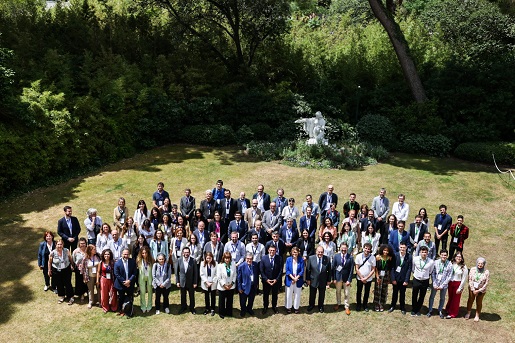- Minister Serret opened MedCat Days 2023, the conference to promote dialogue regarding the Euro-Mediterranean agenda

The Catalan Minister for Foreign Action and European Union, Meritxell Serret i Aleu, opened the third MedCat Days at the Pedralbes Palace in Barcelona, a conference to promote dialogue organised by the Government of Catalonia and the European Institute of the Mediterranean (IEMed) to address the challenges facing the Mediterranean region, such as climate change and the current drought crisis, and the impact of the war in Ukraine.
In its third year, MedCat Days is now a well-established meeting point for Catalan and international actors in the Mediterranean, providing an opportunity to analyse Euro-Mediterranean relations and identify innovative mechanisms for multilevel governance. The conference will bring together political, economic and civic leaders from the region to debate the Euro-Mediterranean agenda and discuss relations on the three shores of the Mediterranean in the wake of the war in Ukraine, multilevel governance as a driver for transformation, and how to deal with the drought crisis in the region, one of the most badly affected in the world.
“The Mediterranean is our natural historical, cultural, developmental and relational framework and forms part of our way of life, and it has a key role to play in the future of Europe,” said the minister in her opening speech. Serret also spoke about the need to find joint solutions to common challenges, such as the fight against the climate crisis and, more specifically, drought, which affects the Mediterranean basin in particular. “We share challenges and must share solutions,” she said. ”We need more Euro-Mediterranean policies that have been thought out jointly. Truly transformational policies,” she concluded.
Bilateral meetings with Tangiers and the Southern Region to boost Mediterranean macroregion
At MedCat Days 2023, Minister Serret met with the Vice-President of the Tangier-Tetouan-Al-Hoceima Regional Council International Cooperation Commission, Fatima Zohra El Bakkali Boutaliha, and the Vice-President of the French region of Provence-Alpes-Côte d’Azur, Jean-Pierre Colin. She was able to share with both of them the strategy for promoting the Mediterranean macroregion, an initiative that should serve to provide a joint response to common challenges, such as combating the climate crisis, which is particularly serious in the region. Catalonia, together with Provence-Alpes-Côte d’Azur, is leading this project, while also seeking alliances with its preferential partners on the southern shore, such as Tangiers-Tetouan-Al-Hoceima, in order to involve civil society.
Serret also met with a delegation from the Mediterranean Youth Council, the assembly of 30 young Mediterraneans committed to jointly building a model representative body for young people in the Mediterranean region.
The Euroregion position on drought and water management
This afternoon, the Secretary for Climate Action, Anna Barnadas i López, and the Director-General for Environmental Quality and Climate Change, Mireia Boya e Busquet, emphasised the need for a commitment from the Pyrenees Mediterranean Euroregion to combat drought, one of the main effects of climate change in the Mediterranean basin. Indeed, the clearest climate hazards in the Euroregion territory are the rise in average temperatures and more sporadic precipitation, with longer periods of drought and more intense rainfall, which have a serious impact on the availability of water.
At MedCat Days 2023, the members of the Euroregion Pyrenees Mediterranean (the governments of Occitania, the Balearic Islands and Catalonia) signed a joint position on drought and water management. The document calls on the European Union to create specific lines in the current funding instruments and promote policy spaces such as the Mediterranean macroregion to mitigate and adapt to the lack of a guaranteed water supply.
It also underlines the need for a paradigm shift in managing water resources, involving promoting circular management, boosting reclaimed and desalinated water in coastal urban areas, fostering modernisation in agricultural irrigation, integrating water scarcity into sectoral and territorial plans, effectively implementing environmental, maintenance or ecological flows, integrating adaptive forest management into water planning and the revision of river basin management plans, and promoting the creation of a common rather than compartmentalised water management model.
